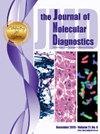Concordance of Whole-Genome Long-Read Sequencing with Standard Clinical Testing for Prader-Willi and Angelman Syndromes
IF 3.4
3区 医学
Q1 PATHOLOGY
引用次数: 0
Abstract
Current clinical testing approaches for individuals with suspected imprinting disorders are complex, often requiring multiple tests performed in a stepwise manner to make a precise molecular diagnosis. We investigated whether whole-genome long-read sequencing could be used as a single data source to simultaneously evaluate copy number variants, single-nucleotide variants, structural variants, and differences in methylation in a cohort of individuals known to have either Prader-Willi or Angelman syndrome. Twenty-five individuals sequenced to an average depth of coverage of 36× on an Oxford Nanopore Technologies PromethION were evaluated. A custom one-page report was generated that could be used to assess copy number, single-nucleotide variants, and methylation patterns at select CpG sites within the 15q11.2-q13.1 region and prioritize candidate pathogenic variants in UBE3A. After training with three positive controls, three analysts blinded to the known clinical diagnosis arrived at the correct molecular diagnosis for 22 of 22 cases (20 true positive, 2 negative controls). Our findings demonstrate the utility of long-read sequencing as a single, comprehensive data source for complex clinical testing, offering potential benefits, such as reduced testing costs, increased diagnostic yield, and shorter turnaround times, in the clinical laboratory.
Prader-Willi综合征和Angelman综合征的全基因组长读测序与标准临床测试的一致性。
目前对疑似印痕障碍患者的临床检测方法很复杂,通常需要以逐步的方式进行多次检测才能做出精确的分子诊断。我们研究了全基因组长读测序(LRS)是否可以作为单一数据源来同时评估拷贝数变异(CNVs)、单核苷酸变异(SNVs)、结构变异(SVs)以及已知患有prder - willi综合征或Angelman综合征的个体的甲基化差异。我们评估了25个个体,在Oxford Nanopore PromethION上测序的平均覆盖深度为36倍。生成了一份定制的一页报告,可用于评估15q11.2-q13.1区域内选定CpG位点的拷贝数、snv和甲基化模式,并优先考虑UBE3A的候选致病变异。经过三个阳性对照的训练,三名不知道已知临床诊断的分析人员对22例中的22例(20例真阳性对照,2例阴性对照)得出了正确的分子诊断。我们的研究结果表明,LRS作为复杂临床测试的单一、全面的数据源,具有降低测试成本、提高诊断产量和缩短临床实验室周转时间等潜在优势。
本文章由计算机程序翻译,如有差异,请以英文原文为准。
求助全文
约1分钟内获得全文
求助全文
来源期刊
CiteScore
8.10
自引率
2.40%
发文量
143
审稿时长
43 days
期刊介绍:
The Journal of Molecular Diagnostics, the official publication of the Association for Molecular Pathology (AMP), co-owned by the American Society for Investigative Pathology (ASIP), seeks to publish high quality original papers on scientific advances in the translation and validation of molecular discoveries in medicine into the clinical diagnostic setting, and the description and application of technological advances in the field of molecular diagnostic medicine. The editors welcome for review articles that contain: novel discoveries or clinicopathologic correlations including studies in oncology, infectious diseases, inherited diseases, predisposition to disease, clinical informatics, or the description of polymorphisms linked to disease states or normal variations; the application of diagnostic methodologies in clinical trials; or the development of new or improved molecular methods which may be applied to diagnosis or monitoring of disease or disease predisposition.

 求助内容:
求助内容: 应助结果提醒方式:
应助结果提醒方式:


